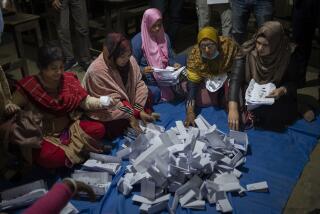Bhutto Survives No-Confidence Motion : Pakistan: The prime minister repels her most serious challenge by 12 votes. But analysts say that she is still mired in controversy and crisis.
- Share via
ISLAMABAD, Pakistan — Prime Minister Benazir Bhutto, stung by widespread charges of corruption and incompetence, clung precariously to power Wednesday, barely defeating a parliamentary motion of no confidence that would have brought down her year-old government.
Of the 237 members of Parliament, 107 voted to support the motion of no confidence, 12 short of the 119 needed; 125 voted with Bhutto, and five were absent. It was the most serious challenge to Bhutto since she was swept to power last November in Pakistan’s first popular elections after more than a decade of military rule.
As she left the National Assembly, Bhutto’s supporters showered her with rose petals. But independent analysts and leaders of the political opposition said that despite the vote, Bhutto is still deeply mired in controversy and crisis.
Bhutto herself, at a press conference, seemed more troubled than triumphant.
“I think it is time for reflection,” she said, “reflection by the government and by the moderate opposition. The no-confidence motion should have given everyone food for thought.”
Referring to charges that members of the assembly had been kidnaped and bribed by both parties to ensure their votes, she said that such behavior “discredits the democratic and political process.”
Last week, Bhutto’s party rounded up many of its members in the assembly and flew them in air force planes to a remote mountain retreat in an effort to ensure their loyalty. The opposition took similar steps.
“When we hear of such horse trading . . . it is democracy and Parliament itself which are undermined,” she said. “So we are all losers.”
Bhutto conceded that her party has made mistakes.
“We are not angels,” she said, adding that she will reorganize her Cabinet and expand the political base of her Pakistan People’s Party after meeting with moderate elements of the opposition.
But she insisted that she still has the support of most Pakistanis.
Opposition leaders disputed this. Ghulam Mustafa Jatoi, who heads a loose coalition known as the Combined Opposition Parties, said exultantly that the opposition “has achieved a major victory.”
“The slim margin with which the prime minister has escaped ouster demonstrates the strength and unity of the opposition,” he said. “The most unpopular and incompetent government in Pakistani history cannot survive for very long.”
Another opposition leader, Mian Nawaz Sharif, who coordinated the parliamentary effort to unseat Bhutto, pledged to redouble the effort to bring down the government.
“When the margin is so narrow,” he said in an interview, “anything can happen, any time.”
Diplomats and independent analysts confirmed that the opposition has gained ground. By getting 107 of the 237 legislators to back the no-confidence motion, the opposition added 45 votes to the seats it won in last year’s election. With 12 more votes, they noted, Bhutto’s government would have fallen.
The analysts said the reason for Bhutto’s diminishing support, in the assembly and among the populace, is her government’s apparent inability to govern, along with persistent but unconfirmed charges that members of her family are involved in corrupt practices.
Pakistani and foreign analysts say the Bhutto government has not enacted any significant legislation.
Despite the rancor, both sides applauded when the two-hour assembly session ended. Leaders on both sides agreed that in this country where power has changed hands more often by coup than by political process, the mere fact that the vote had taken place was a victory for democracy.
More to Read
Sign up for Essential California
The most important California stories and recommendations in your inbox every morning.
You may occasionally receive promotional content from the Los Angeles Times.










